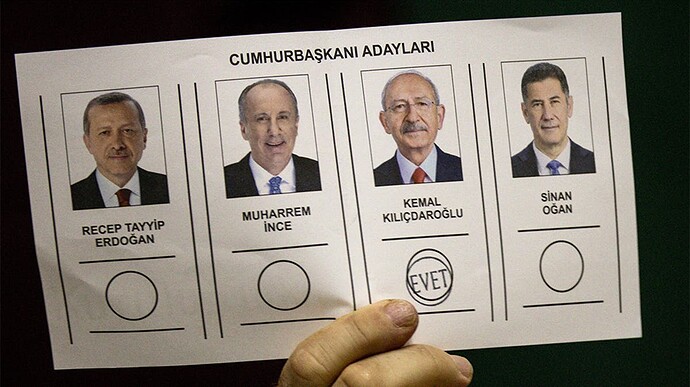The 2018 Turkish presidential election took place on June 24, 2018, with incumbent President Recep Tayyip Erdogan winning a new five-year term. The election was notable for several reasons, including the fact that it was the first time that presidential and parliamentary elections were held simultaneously in Turkey.
Background
Turkey is a republic with a president who serves as both the head of state and the head of government. The president is elected by popular vote for a term of five years, and can serve a maximum of two terms. Prior to the 2018 election, the president in Turkey was elected by parliament.
The 2018 election was the first to be held under a new constitution that was adopted in a referendum in April 2017. The new constitution made significant changes to the presidential system in Turkey, giving the president greater powers and abolishing the position of prime minister.
Candidates
There were six candidates in the 2018 presidential election, including the incumbent President Recep Tayyip Erdogan. The other candidates were:
- Muharrem Ince, a member of parliament and candidate of the main opposition Republican People’s Party (CHP).
- Selahattin Demirtas, the former co-leader of the Peoples’ Democratic Party (HDP).
- Meral Aksener, the leader of the newly-formed Good Party (IYI).
- Temel Karamollaoglu, the leader of the Islamist Saadet Party.
- Dogu Perincek, the leader of the left-wing Homeland Party.
Campaign
The campaign for the presidential election was marked by a number of controversies, including allegations of media censorship, restrictions on freedom of expression, and concerns about the fairness of the election. Several opposition candidates also faced legal challenges and obstacles to their campaigns.
President Erdogan ran on a platform of economic growth, security, and stability. He pointed to his record of reducing inflation, increasing foreign investment, and securing Turkey’s borders against terrorism and threats from abroad. He also highlighted his efforts to modernize Turkey and promote Islamic values.
Opposition candidate Muharrem Ince campaigned on a platform of democracy, justice, and a more democratic Turkey. He criticized Erdogan for his authoritarian style of government, his crackdown on civil liberties and free speech, and his handling of the economy.
Selahattin Demirtas, who was campaigning from prison, focused on issues of social justice and minority rights. He criticized Erdogan for his treatment of Kurdish people and other minorities, and called for a more inclusive and democratic society.
Results
The official results of the 2018 presidential election gave President Erdogan a victory with 52.6% of the vote. Muharrem Ince came in second with 30.6% of the vote, while Selahattin Demirtas received 8.4% of the vote. The other three candidates each received less than 8% of the vote.
President Erdogan’s victory was widely expected, given his popularity and his control over much of the media and the state apparatus. However, the opposition had hoped to force Erdogan into a second round of voting, which would have given them a chance to unite behind a single candidate and challenge him more effectively.
The parliamentary elections held alongside the presidential election also produced a victory for Erdogan’s ruling party, the Justice and Development Party (AKP), and its coalition partner, the Nationalist Movement Party (MHP).
Controversies
The 2018 presidential election was marred by a number of controversies and allegations of irregularities. Opposition parties and international observers criticized the elections for being unfair and lacking transparency.
One of the main concerns was over the unequal distribution of media coverage, with President Erdogan receiving significantly more airtime and coverage than his opponents. There were also allegations of censorship and restrictions on internet and social media access in the lead-up to the election.
Opposition parties also raised concerns about discrepancies in the vote count, with some claiming that there were instances of ballot boxes being stuffed or votes being manipulated. The electoral commission dismissed these allegations, but they added to the sense of mistrust and controversy surrounding the election.
Conclusion
The 2018 Turkish presidential election was a significant event in the country’s history, marking the first time that simultaneous presidential and parliamentary elections were held. President Erdogan’s victory was unsurprising, but the election was marred by controversy and concerns about transparency and fairness. The opposition will be looking to regroup and mount a more effective challenge to Erdogan in the future, in what remains a highly polarized and contested political climate in Turkey.
Disclaimer
6do Encyclopedia represents the inaugural AI-driven knowledge repository, and we cordially invite all community users to collaborate and contribute to the enhancement of its accuracy and completeness.
Should you identify any inaccuracies or discrepancies, we respectfully request that you promptly bring these to our attention. Furthermore, you are encouraged to engage in dialogue with the 6do AI chatbot for clarifications.
Please be advised that when utilizing the resources provided by 6do Encyclopedia, users must exercise due care and diligence with respect to the information contained therein. We expressly disclaim any and all legal liabilities arising from the use of such content.

